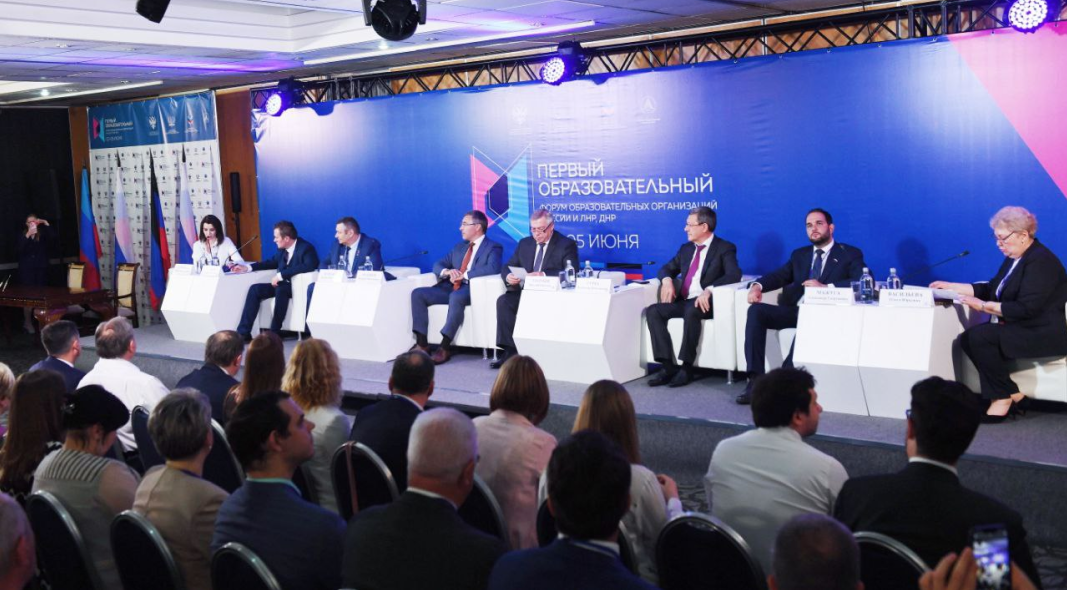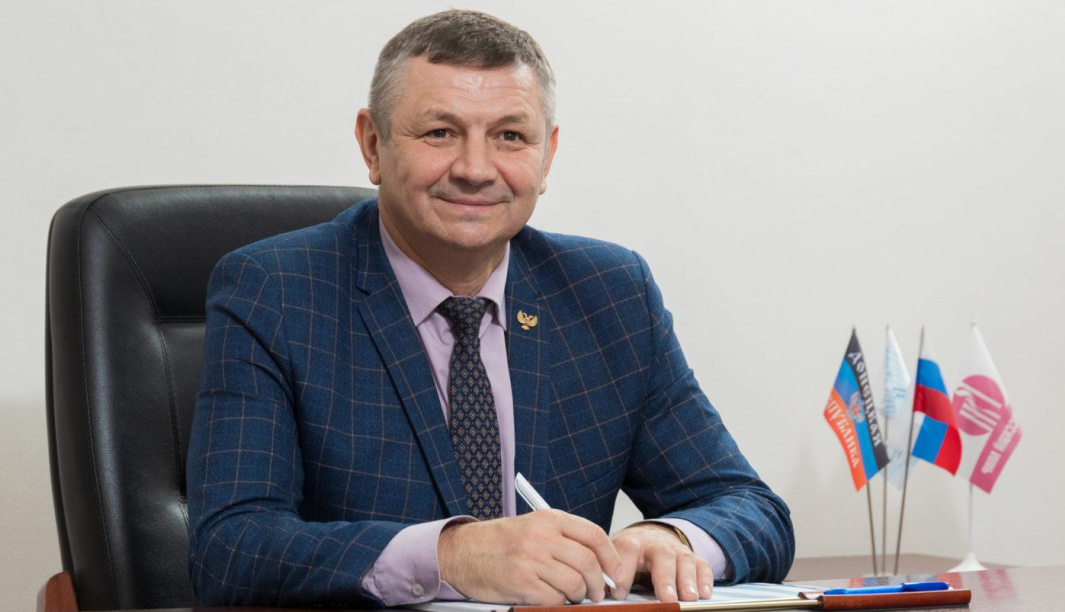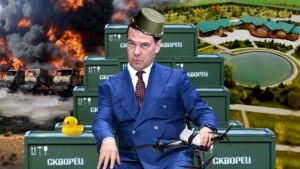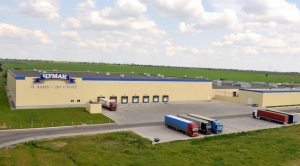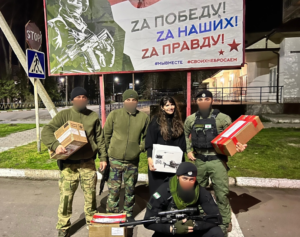From the Russian occupation of Crimea in 2014 onwards, the Russian military aggression against Ukraine has been accompanied by cultural \ ideological aggression. Russian TV, church, Russian school manuals and «military patriotic education» intervened into occupied Crimea and Donbas after the Russian army. The full scale war launched by the Russian Federation on February 24, 2022 follows this path.
The so-called «First educational forum of educational institutions of the Russian Federation, Donetsk and Luhansk People’s Republics». Photo: minobrnauki.gov.ru
Russian occupants try to impose their own cultural and educational agenda on occupied territories. Sometimes these attempts look weird – like changing Ukrainian road signs to Russian or installing monuments of «the chief of the worldwide proletariat» . At the same time, it is not worth underestimating Russian efforts in this sphere. Behind poor ideology of the «Russian world», serious threat of cultural, intellectual and spiritual degradation of people on occupied territories is hiding. Occupied Crimea and Donbas give sufficient evidence.
Before full scale invasion into Ukraine, the Russian Federation officially «recognized» so-called «DNR» and «LNR» (Donetsk and Luhansk People’s Republics). President Putin recognized «sovereignty and independency of people’s republic» by his decrees # 71 and 72 from February 21, 2022. It means he officially recognized his full responsibility for these quasi-states. His decrees did not become the trigger for the full scale war but they launched «integration processes» as Russian authorities call them.
How Moscow «cares» about higher education in Donetsk and Luhansk People’s Republics
The Russian Ministry of Science and Higher Education issued on May 5, 2022 the Order № 439 «About Organization of Interaction of Higher Education Institutions of the Russian Federation with Higher Education Institutions of Donetsk People’s Republic and Luhansk People’s Republic».
The Order defines 24 higher education institutions of the Russian Federation which will be «curators» of 22 «higher education institutions» in «DNR» and «LNR». Russian higher education institutions should conclude special agreements with their counterparts on occupied territory. The following priorities of cooperation are listed: «joint implementation of education programs», «increasing the qualification of teachers and professors», «securing the methodological support», «organization of internships».
The Order stipulates that graduates of higher education institutions in DNR \ LNR could receive «double use diplomas». It means that students in «people’s republics» are openly encouraged to enter the Russian labor market.
The implementation of the Order # 439 is coordinated by the respective department within the Russian Ministry of Science and Higher Education, with special unit on interregional and international cooperation. Three deputy ministers are responsible for its implementation.
So-called «DNR» began «introducing» Russian educational, validation and qualification practices far earlier. Mikhail Kushakov, the «minister of education and science of DNR», declared in August 2019 about «transition to Russian standards of general education» from September 1, 2020. It is remarkable that before 2015 he managed so-called «Transnistrian State University» situated on the territory of «Pridnestrovian Moldavian Republic», unrecognized breakaway state controlled by the Russian Federation since 1991.
«DNR» started transition to Russian standards of final evaluation or tried to copy them since 2016\2017. The transition to Russian standards was envisioned in «the concept of the reform of education and science in DNR until 2030» adopted in 2016, in accordance with the information of the State Security Service of Ukraine. Educational documents issued in so-called DNR\LNR were de jure recognized by the Russian Federation in 2017.
In 2019\2020, graduates of educational institutions of «DNR» accredited in the Russian Federation received over 2,5 thousand Russian diplomas, in accordance with the State Security Service of Ukraine. Their number exceeds 8 thousand diplomas since 2014.
«Issuance of official documents of the Russian Federation to organizations and institutions on the Ukrainian territory confirms that Russia controls occupied territories of Donetsk and Luhansk oblast, manages local processes and strengthens its activity while masking it under bodies of so-called «DNR» and «LNR», as the State Security Service reported.
In 2016, «Russian or Ukrainian language» is indicated as an obligatory exam by presentation materials about «state final exams» in «DNR». Later «young republic» indicated only «Russian language» exam.
The order of the so-called «Ministry of Education and Science of DNR» from 22.12.20 approved the procedure of final exams or attestation. It copied the Russian standard of the Single State Exam (SSE) and stipulated two obligatory exams (the Russian language and mathematics) and two voluntary exams (subjects to be selected by students themselves: chemistry, biology, physics, history, literature, geography, informatics, social sciences). At the same time, «higher education institutions of DNR\LNR» received Russian accreditation.
In 2022, «people’s republics» reached the new level of «integration in the education». After mid-May 2022 Russian higher education institutions initiated active consultations with their «partners» in «DNR\LNR».
Here are examples. «Minister» Kushakov met with delegation of Higher School of Economics (Moscow) on May, 20, 2022. Academic councils of Russian Economic University named after Plekhanov and so-called «Donetsk National University of Economics and Trade named after M.Tuhan-Baranovsky» conducted joint meeting on May 23. Rectors of the Moscow State University named after Lomonosov and so-called «Donetsk National University» signed an agreement of cooperation on May 24.
«Integration» and «cooperation» evolve very quickly.
First online meeting about cooperation between the «Donetsk National University of Economics and Trade named after Tuhan-Baranovsky» and the Russian Economic University named after Plekhanov was held on May 18, 2022.
In a couple of days, on May 20, 2022, academic councils of both universities approved «network educational programs» for concrete academic subjects.
The rector of the University named after Plekhanov presented these programs at the media forum in Postov-na-Dony on July 4, 2022. Besides «double use diplomas», programs include exchange of library resources, student exchanges etc.
Then, working groups of the Smolensk branch of the University named after Plekhanov and its «partners» in «DNR» discussed the receipt of «diplomas» by graduates from Donetsk on June 8, 2022.
Declared cooperation between the Moscow State University and the «Donetsk National University» also reached high speed. Rectors signed the agreement of cooperation in Moscow on May 24, 2022. Joint meeting of academic councils of universities was held on May 31. The road map of cooperation was approved as an addendum to the agreement of cooperation. Five working groups were set up in the following spheres: main educational programs; academic research; training and re-training; communication work. Coordination also involved various departments within both universities. Meetings of representatives of economic, journalist and law departments of both universities were conducted from the 24th to the 30th of May.
More dangerous is the involvement of «educational institutions of DNR\LNR» into the activity of pseudo-cultural institutions of the Russian Federation as it is about Russian indoctrination of the Ukrainian youth on occupied territories.
Branches of «Russian Historical Society» opened in LNR \ DNR on May 25-26, 2022. Russian delegation was headed by Konstantin Mogilevsky, the director of foundation «History of Motherland». This «non-commercial organization» was created by the decree of President Putin. Its Supervisory Board is headed by Sergei Naryshkin, the director of the Russian Foreign Intelligence Service.
Newly created Donetsk branch of the «Society» was headed by «the dean of the faculty of history of the Donetsk National University».
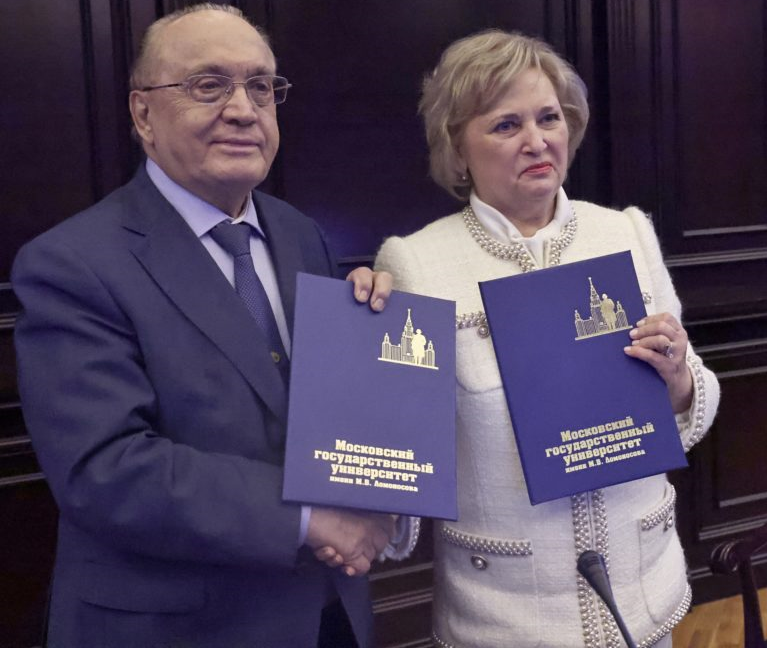
Viktor Sadovnychy, the rector of the Moscow State University, and Svetlana Bespalova, «the rector of the Donetsk National University», conclude an agreement of cooperation. Photo: donnu.ru
«DNR» branch of another Russian pseudo-cultural organization «Russian Military Historical Society» was founded on June 10, 2022.
«The First educational forum of educational institutions of Russia, DNR and LNR» was held in Rostov-na-Donu on June 3-5, 2022. Forum resolution emphasized «the support of student media centers». In accordance with the Russian Ministry of Science of Higher Education, the goal of the forum was «to shape unified educational space, develop training activity, youth policy, and volunteer movement as well as to preserve the historical memory». «History teachers» from «DNR» and «LNR» received «diplomas» certifying their completion of «higher qualification courses». Courses were conducted on the basis of the Southern Federal University in Rostov-na-Donu.
The Russian government informed about preparation of the agreement on «mutual recognition of education, qualifications and academic degrees» of the Russian Federation and «DNR» on June 1, 2022. The draft agreement about «mutual recognition of diplomas» was supported by the order of the Russian government # 1351-r from 28.05.2022
Dubious perspectives of «higher education» on occupied territory
Russian authorities launched integration of higher education system of «people’s republics» with Russian environment very quickly – within one month. Key measures can be summarized as follows:
- In 2022, nineteen (!) «points» for passing Russian «single state exam» were set up in «DNR» and «LNR». The Russian Federal Service for Supervision in Education and Science certified those «points»
- Russian universities established «partnership» relations with their «colleagues» in «DNR» \ «LNR». Declared tasks of this activity are to «unify» the curriculum; exchange methodological and training materials; increase qualification of personnel. Special emphasis is put on disseminating the Russian language as the «vehicle» of empire ideology and teaching «history»
- Legitimization of educational documents has been also carefully considered
The latter process is tackled from two angles. First, the Russian ministry applied the scheme of «double use diplomas» tested in Crimea when «diplomas» of graduates from «DNR» \ «LNR» were recognized by Crimean occupation authorities. Second, the Russian government is going to legalize «educational qualifications» received in «DNR» \ «LNR». It is unclear whether these measures will increase the prestige of Donetsk «universities» or, on the contrary, will undermine the world wide prestige of the Russian higher education.
However, previous Crimean experience is not encouraging. In order to legalize abroad Crimean diplomas about higher education, the Russian Federation had to create special proxy or shell organizations. They desperately needed such «legalization» as students from India or countries of the former USSR kept entering Crimean universities.
The task formulated by the order # 439 of the Russian Ministry of Science and Higher Education seems to be far more complicated than «Crimean problem» of 2014. «DNR» \ «LNR» are not yet annexed by the Russian Federation as it happened with Crimea.
At the same time, current Russian agenda for «DNR» \ «LNR» largely follows the Crimean path, as it was formulated by the Russian federal law # 84-F3 from May 5, 2014. Though this law does not yet cover «DNR» \ «LNR», the Russian authorities do not make exceptions for them. Such an approach is different from the situation in Crimea in 2014 when Crimean students were given the opportunity not to pass single state exam.
The Russian Federation aggressively draws in its cultural and educational framework those people who live on Ukrainian territories occupied after February 24, 2022. «Heads» and «mayors» appointed by Russian occupants demonstrate unprecedented speed in adopting relevant decisions. For example, Tetyana Kuzmich, the so-called «head of department of education and science» of Kherson region, declared that the tuition in Kherson schools would be conducted on the basis of Russian standards after September 1, 2022. Russian manuals will be supplied to the region by the end of August whereas teachers will go through special re-training courses in Crimea or online.
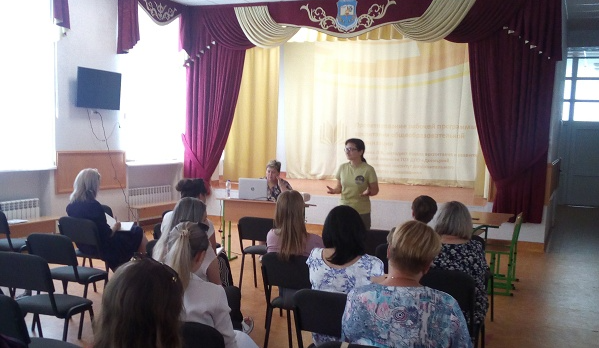
Methodological seminar on professional issues for teachers in Novoazovsky district of «Donetsk People’s Republic». Photo: «the Ministry of Education and Science of DNR»
It is very likely that the pressure on teachers in Donetsk and Luhansk regions will grow. The so-called «Ministry of Education and Science of DNR» reported about conducting «methodological seminars» for teachers on occupied territories in Novoazovsky district. Special emphasis was put on teaching «history of Russia» and «patriotic education».
It is not worth ignoring these «integration attempts» on occupied territories, though perspective of expanding «educational standards of DNR» or introducing «double use diplomas of the Russian Federation» may seem ridiculous. Silent sabotage and resistance by Ukrainian teachers and educational managers are the main reason these Russian attempts fail. As an outcome, Russian occupants started using open violence against them as the abduction of Maksym Vinnyk, the pro-rector of Kherson State University, demonstrates.
It should be also noted that the Decree of the President of Ukraine from June 9, 2022 # 401 sanctioned Russian higher education institutions and their managers and banned any cooperation with them for Ukrainian legal entities and citizens.
Borys Petrunyok for the Center for Journalist Investigations

